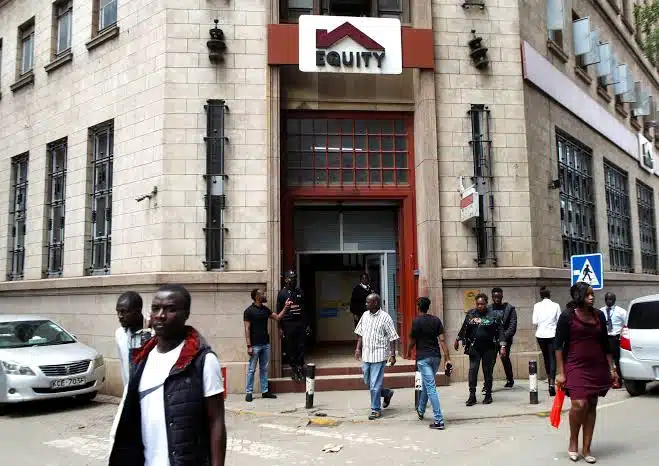Equity Group Holdings Plc, the largest bank in East and Central Africa by market capitalisation, has terminated the services of over 1,500 employees as part of a sweeping internal crackdown triggered by a $11.6 million payroll fraud loss discovered last year.
The bank, headquartered in Nairobi and listed on the Nairobi Securities Exchange, issued dismissal notices to 1,200 staff on Wednesday.
This, in addition to earlier dismissals, brings the official tally of terminated employees this year to over 1,500, making it one of the largest layoffs in Kenya’s banking sector in recent years.
The sackings follow an internal audit launched on April 14, which the lender says uncovered a trail of suspicious transactions involving M-Pesa and bank accounts linked to its staff.
The audit is part of a broader ethics overhaul led by Group Managing Director and CEO James Mwangi, who said the lender would stop at nothing to protect customer funds and rebuild trust.
“It doesn’t matter how many I will lose. I don’t even care. I will clean the bank and I will be ruthless,” Dr. Mwangi said in an interview with a local media outlet “This is not a toll station.”
The trigger for the audit, according to Mwangi, was the July 2024 discovery of a $11.6 million payroll scam orchestrated by an employee in collusion with others.
Legal proceedings against those involved are ongoing, but the revelation has shaken the bank’s internal controls and prompted a re-examination of staff conduct across departments.
The termination letters issued indicate immediate effect, with employees entitled to pay until their last working day, compensation for unused leave, and a month’s salary in lieu of notice, less any outstanding dues.
Earlier waves of dismissals fuel accusations
Wednesday’s sackings follow earlier phases of terminations, including the dismissal of 286 employees earlier this month.
Between May 23 and 28, another 108 staff were reportedly summoned to explain flagged transactions, of whom 40 resigned voluntarily, and 42 failed to justify their dealings.
The audit reportedly focused on cases where staff received money from customers or colleagues into personal salary accounts or linked M-Pesa numbers.
Some involved loan disbursements or forex transactions that were followed by deposits into employees’ accounts, raising concerns about conflict of interest and possible kickbacks.
“If you gave a loan and the first transaction from the loan money is to your account… we can see what you did,” said Mwangi.
“If you sold foreign currency to a customer at a lower rate and then there is a transaction from the customer to your account, we can also see.”
While the bank insists the moves are necessary to enforce ethical conduct, affected employees argue the implementation has been inconsistent.
Some claim they were dismissed over relatively minor personal transactions, even after providing documentation to explain them.
Internally, the rapid and large-scale terminations have sparked unease, with insiders suggesting the actual number of affected staff could be higher.
The cuts have reportedly strained operations in some branches, leading to understaffing and low morale.
Profit dip adds to pressure
The mass terminations come at a challenging period for Equity Group’s financials.
The bank on Wednesday reported a net profit of $119 million for the first quarter ended March 2025, a 4% decline from $124 million in the same period last year.
The dip was largely due to a 12% drop in non-funded income and weak returns from its South Sudan subsidiary. Total income for the period fell 4% year-on-year to $373 million
However, net interest income increased by 3% to $207.4 million, while loan loss provisions dropped by 44% to $26.3 million, providing some cushion against revenue pressure.
Profit before tax stood at $145 million, down 8% year-on-year.
Excluding the underperformance of Equity Bank South Sudan Limited, which posted a $774,000 loss, Group PBT would have increased by 8%, indicating relatively strong performance from other subsidiaries.
Despite the turmoil, the Group says it remains focused on long-term resilience and stakeholder value. “This year, we did not only audit competence and capabilities… we also checked: are you conflicted? Can we trust you?” said Mwangi.
Still, critics warn that the pace and scale of the purge, coupled with performance concerns, may raise broader questions about governance, transparency, and internal accountability at one of Kenya’s most influential financial institutions.









